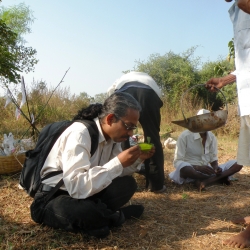Graduate Program: PhD
Supervisor: Dr. John Innes
Region of Interest: India and Canada
Tags: Co-ManagementCommunicationCommunity ForestryFirst NationsSocial
Research Summary
Comparative Study of Communication in Forest Management in India and Canada
To further understand the complexities and find solutions to improve communications between stakeholders he is currently undertaking a comprehensive doctoral research comparing communications in community forestry in India and Canada.
In Gujarat (India) and British Columbia (Canada) many tribal and First Nations communities have initiated ‘Joint Forest Management’ agreements and ‘Community Forestry’ programmes, respectively. However, a lack of adequate communications between Forest Departments and communities has been a challenge that has undermined both the implementation and further development of co-management policies. Ajith’s research uses conventional and theoretical frameworks to understand the challenges and barriers to communication through surveys, interviews and group discussions. The findings are expected to help build a framework to assist practitioners improve communication in such co-management situations.
Why did you choose to do research in this field/region?
To further understand the complexities and find solutions to improve communications between stakeholders he is currently undertaking a comprehensive doctoral research comparing communications in community forestry in India and Canada.
In Gujarat (India) and British Columbia (Canada) many tribal and First Nations communities have initiated ‘Joint Forest Management’ agreements and ‘Community Forestry’ programmes, respectively. However, a lack of adequate communications between Forest Departments and communities has been a challenge that has undermined both the implementation and further development of co-management policies. Ajith’s research uses conventional and theoretical frameworks to understand the challenges and barriers to communication through surveys, interviews and group discussions. The findings are expected to help build a framework to assist practitioners improve communication in such co-management situations.
What is the relevance of your research?
There are a number of potential uses for the results of this research. First, it will contribute to the body of knowledge on communication theory and communication in community forestry in particular. Second, it could inform the development of local strategies by identifying best practices and successful communication strategies Third, the cross cultural and gender research results would help community, policy designers and practitioners to be aware of cultural and gender aspects of communication. Fourth, the framework is expected to be used as an evaluation and improvement tool by stakeholders that aim to increase their understanding about communications. Additionally, it could be used to compare and monitor progress of different situations.
Finally, the outcome of the research will help community leaders, forest managers, NGOs, forest departments, other natural resource managers and industries involved with community level engagement to benefit from this study. A wide range of organizations involved in development communication and extension works will also be able to use the results.
